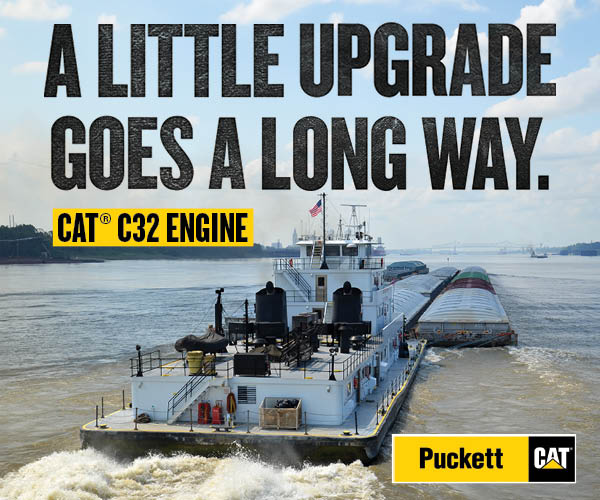COVID-19 Response: How Ergon Marine Is Protecting Its Team And Customers
Across the maritime industry, every company, agency, port or terminal has been impacted by efforts to “flatten the curve” of infections of COVID-19, the disease caused by the novel coronavirus.
Shoreside staff working from home, crews transported by road rather than air and stepped-up disinfecting aboard vessels areall just a small sample of measures being taken to guard against the spread of a disease that has infected more than 600,000 Americans and more than 2 million people globally.
One example of a maritime company’s individualized effort to fight the disease is that of Ergon Marine & Industrial Supply (EMIS), the Vicksburg, Miss.-based midstream and harbor service supply company. EMIS, which also has a base of operations in Memphis, Tenn., offers midstream supply and transport of groceries, fuel, equipment, supplies and crew changes to commercial vessels on the Lower Mississippi River. Part of the Ergon family of companies, EMIS also houses the Vicksburg Information Center (VIC) during high water to manage commercial vessel movements through the Vicksburg bridges.
Because EMIS handles a large number of crew changes, company leaders knew they had to be proactive in protecting individual crew members—and by extension other companies’ operations—while also maintaining an essential service. Danny Koestler, vice president of EMIS, said the business took swift action to screen individuals coming through the company’s boat store and to prevent interaction between different populations.
“We put in a portable building to act as a customer screening facility,” Koestler said. “We check temperatures, ask questions and keep everyone separated. If somebody’s running a temperature, we can turn them around and keep our facility and crew changes isolated.
“That way,” he added, “we can protect us and protect the boats out there, and also try and keep it from impacting industry.”
The screening process applies to employees, customer crew members, anyone making deliveries, shoreside customers and visitors. Each person’s temperature is taken and logged. Then a representative from EMIS asks three main questions: Have you been out of the country? Have you been sick? Have you knowingly been exposed to anyone who has tested positive for COVID-19? All of that information is logged and stored. On site, EMIS has also provided a freestanding restroom. Once the screening is complete, each person is encouraged to await transport inside his or her own vehicle.
In addition, EMIS has closed its crew lounge and moved to daylight-only crew changes. Also, the Coast Guard, at the request of the Lower Mississippi River Committee, or LOMRC, has temporarily suspended the Vicksburg Information Center. Koestler said southbound vessels are continuing to queue themselves in accordance with Coast Guard guidelines as they would if the center were operational.
EMIS implemented the procedures in mid-March. At that time, Koestler, a member of LOMRC, sent the guidelines to both customers and LOMRC. EMIS also developed enhanced guidelines for its harbor vessels for sanitizing and keeping high-touch surfaces clean. Koestler said it’s all about being proactive during this unusual time.
“These are different times; I’ve never seen anything like it in my whole life,” he said. “I think the hardest part of this, psychologically anyway, is that we’re all confined.”
Koestler added that, regardless of how long “social distancing” measures are in place, EMIS will continue forward-leaning efforts to meet customers’ supply needs while also keeping crew members as safe as possible.
Editor’s note: If your company is responding to COVID-19 in an effective, creative way that you’d like to share, contact WJ Editor John Shoulberg at john@wjinc.net.
More Coronavirus-related stories in the WJ:
April 20 issue:
Blessey Marine Video Encourages Team During COVID-19
AWO Webinar On COVID-19 Cleaning Practices Draws Intense Interest
COVID-19 Response: How Ergon Marine Is Protecting Its Team And Customers
Port Nola Launches Digital Learning Resources For Out-Of-School Students
Remembering Longtime New Orleans Maritime Industry Leader Jimmy Amoss
Trump-Mediated Oil Deal Splits Large, Small Producers
Seamen’s Church Institute Launches #stayhomeandknit
Trump Floats Guidelines For States To End Lockdowns
WJ Editorial: Inland Ports Shouldering Through Virus Crisis
April 13 issue:
Seamen’s Church Institute Adapts To Continue Ministries
Best Practices And Liability In Time Of COVID-19
Trump Promises ‘Big Package On Infrastructure’ Soon
WJ Editorial: Barge Industry Is Used To Rising To Challenges
April 6 issue:
Corps Leads Effort To Construct Alternate Care Facilities In COVID-19 Response
WJ Editorial: Lock and Dam Construction Would Help Revive Economy
Crew Change Protocols On MKARNS Updated
March 30 issue (online only):
ACBL Hunkers Down, Keeps Cargoes Moving
WJ Editorial: Amid Virus Crisis, Let’s Not Forget High Water
$2 Trillion Coronavirus Relief Bill Goes To House
March 23 issue:
As COVID-19 Grips Country, Maritime Industry Keeps Moving With Precautions
Publishers Note: This Too Shall Pass, Right?
WJ Editorial: Towboats Will Help Keep Economy Moving
Washington Waves: Battling Coronavirus On Multiple Fronts
AWO Requests Subchapter M Inspection Suspension During Coronavirus Emergency
NMC Extends Document Deadlines, Closes Regional Exam Centers
Agency Guidance: Maritime Workers Are Critical
Coping With Coronavirus In The Marine Industry
PVA Seeks Administration Help As Two Cruise Lines Suspend Operations
Coronavirus Delays Chinese Investors’ Visit To Kentucky Fisheries Park
March 16 Issue:
Coronavirus Cancels Events, Cruise Vessels Ponder Ban
Virus Panic, Saudi Move Affect Oil Markets
Trump Imposes Travel Ban From Europe
March 9 issue:
Infrastructure Spending Eyed As Economic Stimulus
March 2 issue:
WJ Editorial: Coronavirus Hits Global Shipping
Pence To Lead Coronavirus Task Force
February 17 issue:
February 10 issue:
Ports, Maritime Industry Keep Careful Watch For Coronavirus
China Lifts Tariffs On $75 Billion Of U.S. Goods



